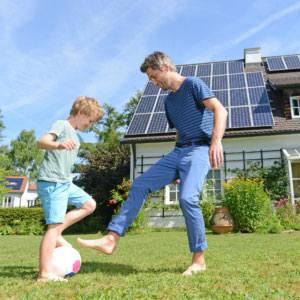Can A House Run On Solar Power Alone?
The popularity of solar power is growing rapidly. However, there are still many questions about the power of solar power and how many solar panels are needed to power a house. These are the answers to your questions.
How does solar energy work?
Solar panels capture photons or particles of light. Photons are responsible for breaking down electrons from their atoms and generating what we call the flow of electricity.
This statement might sound complex depending on how much science you have learned since high school. However, the key takeaway is that sunlight can be converted into energy by a simple, yet complicated process. It involves capturing the sun's energy and then turning it into electricity. The energy can be used to power products and homes, as well as devices.
You can learn more about solar energy sciences by solar guide.
What are the solar benefits?
- Solar energy is a renewable source of energy
- Solar reduces your electricity bill
- Solar energy is good for the environment
- Solar energy provides grid independence
Yes, that's the short answer! A house can be run entirely on solar power by installing enough solar panels and batteries. However, there are significant capital costs and physical restrictions. These costs will likely decrease as solar power technology improves. Solar is now a more feasible option for residential customers.
Although there are no electricity needs, remote homes can run entirely on solar power. Homes with higher load appliances often use solar backup power and grid power to provide power during cloudy days or winter when the sun's power is lower. However, technology has improved sufficiently to allow homes to be powered completely. Here's how to evaluate.
Factors to be aware of
To determine if a solar-powered system is feasible for your home, you should consult with solar installers and repairers. You should take into account:
1. The location of the home
Your home's location is an important factor in determining your sun power capacity. South Africa enjoys the greatest sun exposure, making solar power backup an excellent option for sustainable energy. South African residents will require direct sunlight for enough hours during the day to enjoy the benefits of sunshine. People who live in shaded areas, such as close to trees or adjacent buildings might have to think about alternative locations for the solar panel.
2. Solar panels can be mounted on roofs
Solar panels are best placed on the roof because they have direct sunlight and are far from the sun. Next, you need to assess whether the roof can support the amount of solar panels required for a complete solar power system. It should be in excellent condition without any need for replacement.
3. How many solar panels are required to power a house?
Based on where they live, how much shade they have, and their energy requirements, different households will require different amounts of solar panel numbers. The average household uses around 10 400kWh of solar energy per year. This is a rough estimate. You will need between 28 and 34 solar panels to power your home if you install 250-watt panels.
4. How to calculate your own estimate for a solar panel
It is best to speak with experts in the industry before you calculate your solar panel number. You can also estimate the required solar panel power by assessing your current power consumption. Calculate how many kWh of electricity your household uses annually. 1kWh is 1 000 W of power per hour. A household averages around 897kWh per month. That's almost 11 000kWh per year.
There are many benefits to solar power. You may not want to completely disconnect from the grid, but the system can be scaled. You can start with what you are able to afford, and then increase your spending as your needs change or your funds become available.

